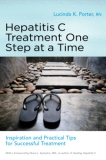 The following is from Chapter 2, Preparing for Treatment:
The following is from Chapter 2, Preparing for Treatment:
Treatment is like a marathon race-advanced preparation is critical to successful completion. This chapter suggests ways you can prepare yourself physically, mentally, and emotionally for this big event.
Success depends upon previous preparation, and without such preparation, there is sure to be failure.-Confucius
Discuss HCV Treatment Options with Your Medical Provider. In addition to resources, your provider is the one who should have answers to your questions.
- What are the pros and cons of treatment?
- What medications does your medical provider suggest for you?
- How are the medications taken? If one of the medications is injectable, will you need to give it to yourself? If so, will you be shown how to do this?
- Are there any special storage requirements for the HCV drugs?
- What are the most common side effects?
- How long will treatment last?
- How is it determined that treatment is or is not working, and when will you know?
- How often are the lab tests and medical appointments?
- Will you need a liver biopsy or other diagnostic tests?
- Will treatment affect your work? Your relationships? Your sex life?
- How much will treatment cost? Are there financial assistance programs available to help reduce out-of-pocket costs?
- Are there any drugs, herbs, or supplements that may interact with the HCV treatment medications?
- What immunizations does your medical provider recommend, and are you up-to-date on these?
- Are there any hepatitis C groups in the area?
- What do you do if you miss a dose of medication?
- If you need support from your medical provider during treatment, who do you contact in the office, especially after regular business hours?
- Is there a list of side effects that may require urgent medical attention? If not, what are some situations in which you should call your provider immediately? Here is a list of medical problems that may need emergency care:
- Chest pain
- Breathing difficulties
- Dizziness
- Severe depression, thoughts of harming yourself or others, and mania (periods of very high moods followed by very low moods)
- A persistent fever over 100°F or fever that continues to elevate
- Vision changes-double, blurred, and decreased or loss of vision
- Bloody diarrhea
- Unusual bleeding or bruising
- Severe pain in your stomach or lower back
- Weakness, loss of coordination, numbness, or difficulty speaking
- A rash with fever, blisters, swelling, or sores in the mouth, nose,or eyes
- Hearing loss
- Any symptom that might be potentially life threatening or causes excessive anxiety
 Lucinda K. Porter, RN is an author, hepatitis C advocate and health educator. You can read more of her work on her Hep Blog. Click here to learn more about her book “Hepatitis C Treatment One Step at a Time.”
Lucinda K. Porter, RN is an author, hepatitis C advocate and health educator. You can read more of her work on her Hep Blog. Click here to learn more about her book “Hepatitis C Treatment One Step at a Time.”






Comments
Comments